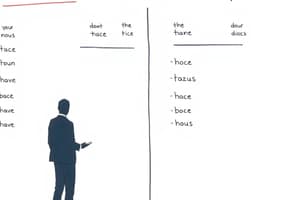Podcast
Questions and Answers
Which of the following is a proper noun?
Which of the following is a proper noun?
- river
- happiness
- London (correct)
- computer
What type of noun is 'information'?
What type of noun is 'information'?
- Abstract noun (correct)
- Concrete noun
- Collective noun
- Countable noun
What defines a collective noun?
What defines a collective noun?
- It can be individually counted.
- It refers to a specific location.
- It describes a quality or state.
- It denotes a group of individuals or things. (correct)
Which of the following sentences correctly uses a possessive noun?
Which of the following sentences correctly uses a possessive noun?
Which of the following is an example of a compound noun?
Which of the following is an example of a compound noun?
What is the plural form of 'child'?
What is the plural form of 'child'?
In the sentence 'The cat sleeps', what role does 'cat' serve?
In the sentence 'The cat sleeps', what role does 'cat' serve?
Which of the following is NOT a feature of nouns?
Which of the following is NOT a feature of nouns?
What type of noun is 'team'?
What type of noun is 'team'?
Which noun can be classified as uncountable?
Which noun can be classified as uncountable?
Flashcards
Noun
Noun
A word representing a person, place, thing, or idea.
Common Noun
Common Noun
A general name for a person, place, or thing.
Proper Noun
Proper Noun
A specific name of a person, place, or organization (capitalized).
Concrete Noun
Concrete Noun
Signup and view all the flashcards
Abstract Noun
Abstract Noun
Signup and view all the flashcards
Collective Noun
Collective Noun
Signup and view all the flashcards
Countable Noun
Countable Noun
Signup and view all the flashcards
Uncountable Noun
Uncountable Noun
Signup and view all the flashcards
Noun Phrase
Noun Phrase
Signup and view all the flashcards
Pluralization
Pluralization
Signup and view all the flashcards
Study Notes
Definition
- A noun is a word that represents a person, place, thing, or idea.
Types of Nouns
-
Common Nouns
- General names for a person, place, or thing (e.g., dog, city).
-
Proper Nouns
- Specific names of people, places, or organizations (e.g., Sarah, Paris).
- Always capitalized.
-
Concrete Nouns
- Nouns that can be perceived through the senses (e.g., apple, car).
-
Abstract Nouns
- Nouns that represent ideas, qualities, or conditions (e.g., happiness, freedom).
-
Collective Nouns
- Nouns that refer to a group of individuals or things (e.g., team, flock).
-
Compound Nouns
- Nouns made up of two or more words (e.g., toothpaste, basketball).
Functions of Nouns
- Subject: The noun that performs the action in a sentence (e.g., The cat sleeps).
- Object: The noun that receives the action (e.g., She kicked the ball).
- Complement: A noun that provides additional information (e.g., He is a teacher).
Noun Characteristics
-
Countable Nouns
- Can be counted (e.g., book/books).
-
Uncountable Nouns
- Cannot be counted individually (e.g., water, information).
Pluralization
- Regular Nouns: Add -s or -es (e.g., cat/cats, bus/buses).
- Irregular Nouns: Change form (e.g., man/men, tooth/teeth).
Possessive Nouns
- Indicate ownership, typically formed by adding an apostrophe (e.g., the dog's bone, the girls' room).
Noun Usage in Sentences
- Can function in various roles:
- Noun Phrase: A group of words that functions like a noun (e.g., The big red balloon).
Grammar Considerations
- Gender: Some nouns have gender (e.g., actor/actress).
- Number: Nouns can be singular or plural.
Examples
- Common Noun: teacher
- Proper Noun: Microsoft
- Concrete Noun: chair
- Abstract Noun: love
- Collective Noun: committee
- Compound Noun: mother-in-law
Understanding nouns is crucial for sentence structure and clarity in communication.
Definition of Nouns
- A noun signifies a person, place, thing, or idea.
Types of Nouns
- Common Nouns: General terms for items (e.g., dog, city).
- Proper Nouns: Specific names of individuals, locations, or organizations, always capitalized (e.g., Sarah, Paris).
- Concrete Nouns: Can be detected via the senses (e.g., apple, car).
- Abstract Nouns: Represent intangible concepts (e.g., happiness, freedom).
- Collective Nouns: Denote groups of people or things (e.g., team, flock).
- Compound Nouns: Formed from two or more words (e.g., toothpaste, basketball).
Functions of Nouns
- Subject: Performs the action in a sentence (e.g., "The cat sleeps").
- Object: Receives the action (e.g., "She kicked the ball").
- Complement: Adds information (e.g., "He is a teacher").
Noun Characteristics
- Countable Nouns: Can be quantified (e.g., book/books).
- Uncountable Nouns: Cannot be counted individually (e.g., water, information).
Pluralization
- Regular Nouns: Typically become plural by adding -s or -es (e.g., cat/cats, bus/buses).
- Irregular Nouns: Change form for pluralization (e.g., man/men, tooth/teeth).
Possessive Nouns
- Indicate ownership using an apostrophe (e.g., "the dog's bone," "the girls' room").
Noun Usage in Sentences
- Can function in various grammatical roles:
- Noun Phrase: A group of words functioning as a single noun (e.g., "The big red balloon").
Grammar Considerations
- Gender: Some nouns may have gender distinctions (e.g., actor/actress).
- Number: Nouns can exist in singular or plural forms.
Examples of Nouns
-
Common Noun: teacher
-
Proper Noun: Microsoft
-
Concrete Noun: chair
-
Abstract Noun: love
-
Collective Noun: committee
-
Compound Noun: mother-in-law
-
Mastery of nouns is essential for constructing clear and effective sentences.
Studying That Suits You
Use AI to generate personalized quizzes and flashcards to suit your learning preferences.




